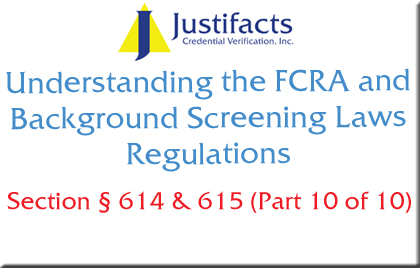Part 10: Section § 614 & 615. Restrictions on Investigative Consumer Reports and Requirements on Users of Consumer Reports

Part 10 of our ten-part series on the FCRA includes an explanation of restrictions to reporting and communicating adverse information to applicants. If this is your first time viewing this series you may want to read the previous entries:
Intro to Understanding the FCRA and Background Screening Laws & Regulations
Part 1: Section § 604. Permissible purposes of consumer reports
Part 2: Section § 605. Requirements relating to information contained in consumer reports
Part 3: Section § 606. Disclosure of investigative consumer reports
Part 4: Section § 607. Compliance Procedures
Part 5: Section § 609. Condition and Form of Disclosure
Part 6: Section § 610. Condition and Form of Disclosure
Part 7: Section § 611. Procedure in Case of Disputed Accuracy
Part 8: Section § 612. Charges for Certain Disclosures
Part 9: Section § 613. Public Record Information for Employment Purposes
Sections 614 and 615 deal with the restrictions on reporting of adverse information and how to communicate adverse action to applicants.
Section § 614 Restrictions on Investigative Consumer Reports
Whenever a consumer reporting agency, such as Justifacts, prepares an investigative consumer report (background check), no adverse information in the consumer report (other than information which is a matter of public record) may be included in a subsequent consumer report unless such adverse information has been verified in the process of making such subsequent report, or the adverse information was received within the three month period preceding the date the subsequent report is furnished.
Section § 615 Requirements on Users of Consumer Reports
Duties of users taking adverse actions on the basis of information contained in consumer reports – If any person takes any adverse action with respect to any consumer (applicant) that is based in whole or in part on any information contained in a consumer report, the person shall:
A. Provide oral, written, or electronic notice of the adverse action to the consumer,
B. Provide to the consumer orally, in writing, or electronically the name, address, and telephone number of the consumer reporting agency (including a toll-free number established by the agency if the agency compiles and maintains files on consumers on a nationwide basis) that furnished the report to the person and a statement that the consumer reporting agency did not make the decision to take the adverse action and is unable to provide the consumer the specific reasons why the adverse action was taken;
C. Provide to the consumer an oral, written, or electronic notice of the consumer’s rights to obtain, within 60 days, a free copy of a consumer report on the consumer from the consumer reporting agency and to dispute with a consumer reporting agency the accuracy or completeness of any information in a consumer report furnished by the agency.
In Conclusion
We must respect the fact that applicants have the right to dispute adverse information found in their background check. Background check companies restrict their ability to add adverse information in any subsequent reports for an applicant. Furthermore, if adverse information is reported on an individual, measures must be taken to provide that individual with the adverse information that is being used against him/her. An applicant must be given the right to directly contact the consumer reporting agency that has conducted the background check on him/her and request a copy of that background check.
It is important to note that Justifacts is providing this information as a service to our clients. None of the information contained herein should be construed as legal advice, nor is Justifacts engaged to provide legal advice. We go to great lengths to make sure our information is accurate and useful. We recommend you consult your attorney or legal department if you want assurance that our information, and your interpretation of it, is appropriate to your particular situation.
Subscribe to our email list to be alerted of our next blog post: |
|---|
|
|




